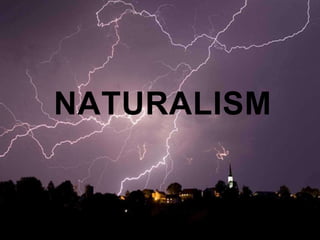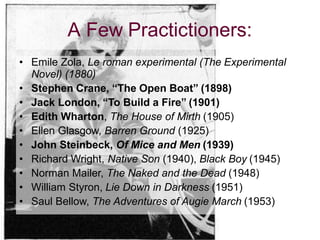NATURALISM_PPT.pptx
- 1. NATURALISM
- 2. While many modern works contain naturalistic elements, naturalism refers specifically to a literary movement that took place in America, England, and France during the late 1800’s and early 1900’s, which produced a unique type of “realistic” fiction.
- 3. In order to understand naturalism, we must first examine realism. • Realism portrays life realistically without “sugarcoating.” – Realists try to “write reality” -- records "the smaller details of everyday life, things that are likely to happen between lunch and supper." -- portrays local color, attempting to accurately portray the customs, speech, dress, and living conditions of their chosen locale. -- rejects the idealized presentations, imaginative settings, the supernatural, and the improbable plot twists of romanticism. • Naturalism is essentially realism with an additional facet: Determinism
- 4. Determinism • Characters do not have free will; external and internal forces control their behavior. – This belief is called determinism. All determinists believe in the existence of the will, but the will is enslaved due to a multitude of reasons. – Characters attempting to exercise free will are hamstrung by forces beyond their control. • Life is an inescapable trap.
- 5. Character’s as Marionettes • Naturalists view individuals as being at the mercy of biological and socioeconomic forces, whereas realists hold that humans have some degree of free will that they can exercise to affect their situations. – Things happen to people, as if they were marionettes whose movements are entirely determined by forces beyond their control.
- 6. Forces Beyond the Character’s Control • Characters are dominated by external or internal forces: • Environmental – A storm, or a character lost at sea • Social conditions – A character born into poverty. • Chance (fate) – A character’s child is suddenly stricken with typhoidfever. • Internal Passions – Lust, greed, or desire for dominance or pleasure overcomerational behavior.
- 7. • Heavily influenced by emergent scientific theories of the time: – Darwin’s theory of evolution • It’s corollary, “survival of the fittest.” • Fight for survival brings out the "brute within" each individual. • conflict is often "man against nature" or "man against himself" “Survival of the Fittest”
- 8. The Indifferent and Omnipotent Power of Nature • Nature/Fate is as an indifferent force acting upon the lives of human beings. – Works often describe the futile attempts of human beings to exercise free will in a universe that ironically reveals that free will is an illusion. – Violence and tragedy is often the result.
- 9. Subject Matter • Generally deals with raw and unpleasant experiences which reduce characters to "degrading" behavior as they struggle to survive. – Characters are mostly from the lower-middle or lower classes • Generally poor, uneducated, and unsophisticated. • “drama of the people working itself out in blood and [filth]” (Norris).
- 10. • The characters are generally commonplace and the unheroic – life is usually the dull struggle of daily existence. – But, the naturalist reveals qualities in their characters that are usually associated with the heroic or adventurous. • Often, acts of violence and passion lead to desperate moments and violent death. – Life at its lowest levels is not so simple as it seems to be. • Panoramic, “slice-of-life" drama – often a "chronicle of despair."
- 11. Naturalism: A Scientific Study • attempts to apply the scientific principles of objectivity and detachment to its study of human beings – The characters are but higher-order animals “fully subject to the forces of heredity and the environment. • These “human beasts” studied impartially, without moralizing about their natures – The story is told in third person, • The narrator is detached, objective, and unsympathetic. – The narrator does not comment on themorality or the fairness of the situations in which characters find themselves • The reader, however, is meant to empathize with the characters.
- 12. Maintaining Dignity in Adversity • Is conditioned and controlled by environment, social conditions, heredity, chance (or fate), or instinct. – But, they have compensating humanistic values which affirm their individuality and life • Their struggle for life becomes heroic and they maintainhuman dignity despite degrading circumstances. • Is faced with overwhelming and oppressive material forces that control their lives. – But, they maintain their self-worth.
- 13. A Few Practictioners: • Emile Zola, Le roman experimental (The Experimental Novel) (1880) • Stephen Crane, “The Open Boat” (1898) • Jack London, “To Build a Fire” (1901) • Edith Wharton, The House of Mirth (1905) • Ellen Glasgow, Barren Ground (1925) • John Steinbeck, Of Mice and Men (1939) • Richard Wright, Native Son (1940), Black Boy (1945) • Norman Mailer, The Naked and the Dead (1948) • William Styron, Lie Down in Darkness (1951) • Saul Bellow, The Adventures of Augie March (1953)
- 14. From "The Open Boat" by Stephen Crane: When it occurs to a man that nature does not regard him as important, and that she feels she would not maim the universe by disposing of him, he at first wishes to throw bricks at the temple, and he hates deeply the fact that there are no bricks and no temples.
- 15. Naturalistic Poem: A man said to the universe: "Sir, I exist!" "However," replied the universe, "The fact has not created in me A sense of obligation." --Stephen Crane (1899)









![Subject
Matter
• Generally deals with raw and unpleasant
experiences which reduce characters to
"degrading" behavior as they struggle to
survive.
– Characters are mostly from the lower-middle
or lower classes
• Generally poor, uneducated, and unsophisticated.
• “drama of the people working itself out in blood
and [filth]” (Norris).](https://image.slidesharecdn.com/naturalismppt-220728152559-78c851e0/85/NATURALISM_PPT-pptx-9-320.jpg)





